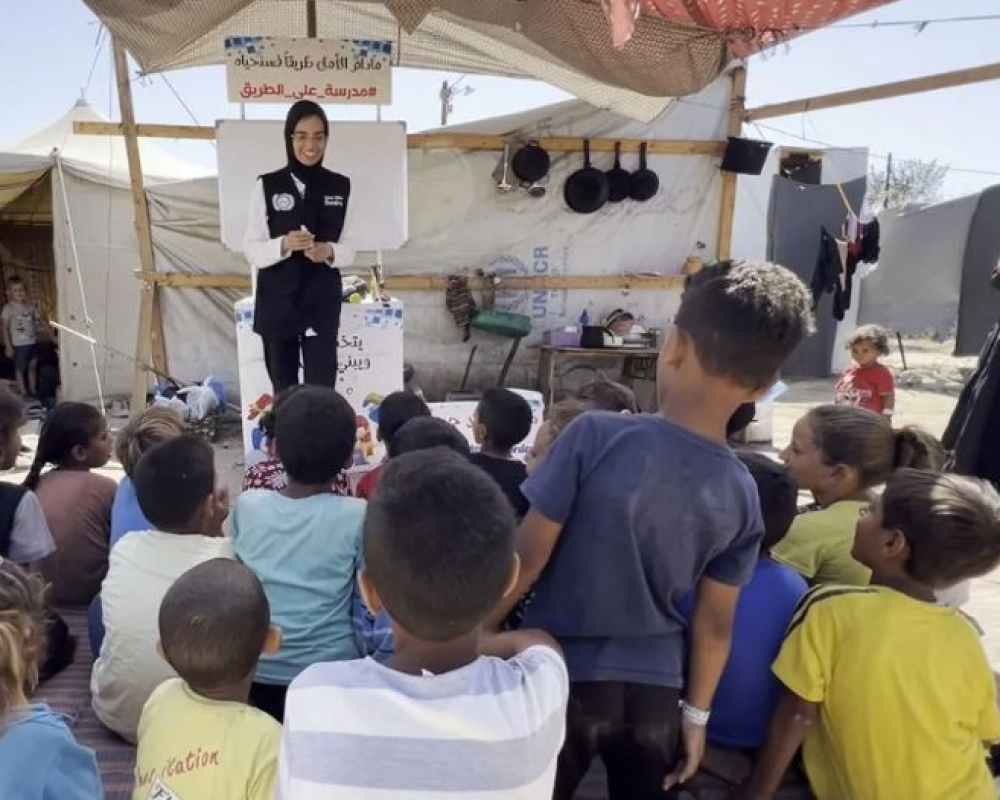
GAZA / PNN /
In the midst of harsh conditions wrought by nine months of continuous Israeli aggression on Gaza, volunteer teacher Noor Nassar, 24, strives to restore children’s right to education, a right stripped away by the relentless Israeli war since October 7th last year. The war has destroyed schools and educational facilities, exacerbating already dire living conditions.
Nassar, forced to leave her home in Rafah in southern Gaza due to Israeli invasion, sought refuge in Deir al-Balah in central Gaza. There, she found herself tasked with the mission of providing education to displaced children.
With unwavering determination, Nassar navigates refugee camps and devastated areas with her mobile school, carried in a large canvas bag. She integrates educational and recreational activities to create interactive environments, easing the tensions exacerbated by war and its aftermath.
Israel's onslaught has completely destroyed approximately 110 schools and universities, and partially damaged 321 more, according to official figures. Over the past nine months, all children have been deprived of their right to education due to the war, with thousands forced onto the streets to support their families or seek basic necessities like food and water.
Upon reaching a displacement camp in central Gaza, Nassar began setting up her classroom by unpacking a small whiteboard from her canvas bag inside a tent. Above the board hangs a sign with two sentences: "School on the Road" and "As long as there is hope, we will live it."
Nassar initiates her teaching process with physical activities designed to stimulate the children's minds and alleviate stress. Speaking to Anadolu Agency, Nassar explains that her initiative, dubbed "School on the Road," aims to "resist occupation through educating children."
"The occupation destroyed schools and educational buildings in an attempt to keep children and students ignorant," she asserts. "Today, through this initiative, we resist this goal and instill a love for learning in children."
Nassar faced numerous challenges in implementing her initiative, including children's reluctance to return to education after engaging in income-generating activities to support their families. "When I asked a child to join the class, he said he preferred to collect money; studying won't help me in these circumstances," she recalls.
This sentiment reflects the concerns of parents who have lost primary breadwinners due to killings, arrests, or injuries. Nassar attempted to overcome this challenge through awareness campaigns targeting both children and their families, emphasizing the importance of returning to education.
After some time, Nassar succeeded in persuading children to leave their street jobs and attend her classes. "Through awareness campaigns, I turned children and families from reluctance to a keen desire to learn," she notes.
Nassar explains that the idea of establishing a mobile school was aimed at reassuring parents about their children's education amidst displacement. "The presence of a school near the children's place of displacement or residence provides reassurance to parents, especially amid the ongoing Israeli shelling and tension in Gaza," she says.
She travels with the mobile school to displacement camps and areas where destroyed homes are being rebuilt. Nassar's mobile school targets children aged 6-11, with plans to expand educational points and reach older age groups.
Ten-year-old Fawaz Al-Ghalayini, who joined the mobile school, tells Anadolu, "I needed this to refresh my memory and regain knowledge after being absent from school for 9 months." He expresses hopes of returning to his home in the northern Gaza Strip.
Similarly, Mohammad Shihab, a displaced child from Gaza City, expresses joy at joining the mobile school. "We needed this break in education," he says, hoping for the continued operation of the school.
On June 4, the United Nations Relief and Works Agency for Palestine Refugees (UNRWA) stated that children in Gaza are enduring an endless nightmare of bombing, forced displacement, food and water shortages, and lack of access to education.
Since October 7th, 2023, Israel has waged a devastating war on Gaza, resulting in approximately 124,000 deaths and injuries, predominantly among children and women, and over 10,000 missing amid massive destruction and famine claiming dozens of children's lives.
Israel continues this war, disregarding UN Security Council resolutions calling for an immediate halt, International Court of Justice orders to end the invasion of Rafah, and measures to prevent genocide and improve the dire humanitarian situation in Gaza.
Tel Aviv also challenges ICC Prosecutor Karim Khan's request to issue arrest warrants against Prime Minister Benjamin Netanyahu and Defense Minister Yoav Galant for "war crimes" and "crimes against humanity" in Gaza.